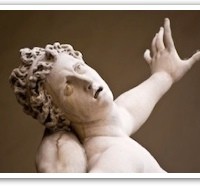A Summer With Virgil, by Bruce Thornton
From Homer’s Iliad to Thucydides’ Peloponnesian War, these five classics make for sublime and delightful beach reading.
“To read the Latin & Greek authors in their original,” Thomas Jefferson once wrote, “is a sublime luxury.” Fortunately, for those who don’t read Greek and Latin, the great works of Classical literature are available in first-rate translations. The following five classics are some of the best works from the astonishing variety and brilliance of Greek and Roman literature.
![]()
Homer, Iliad
The first work of Western literature was written around 750 B.C. The Iliad tells the story of only a few weeks from the ten years of the Greek war against Troy, ignited when Helen ran off with the Trojan Paris. But the Iliad is more than just a celebration of war and martial valor. To be sure, Homer’s admiration for men who will risk their lives in war for eternal glory is obvious, and his descriptions of fighting and dying are still some of the most vivid portraits of men at war we have.
But the Iliad offers much more: At its heart, it is a profound examination of what is best and worst in human nature, of what binds people together into a community and what tears them apart with bloody violence. As Homer tells the story of the “baneful wrath” of Achilles, the “best of the Achaeans,” over his dishonor at the hands of the ruler Agamemnon, he brilliantly shows us the destructive effects of the hero’s code of honor and vengeance against those, even friends, who fail to acknowledge his excellence and great deeds. Achilles’ quest for revenge, driven by a passionate anger he cannot control, in the end sacrifices his own community, his most beloved friend, and ultimately his own humanity. Homer teaches us that no society can survive when its ideals are based on personal honor and glory achieved through violence. Human community and human identity both depend on the “ties that bind,” the mutual obligations and affections we all, even the most brilliant of us, owe one another by virtue of being born into a tragic world of change, loss, and death.
Long before Aristotle, then, Homer understood that we are “political animals,” unable to live without our fellow humans because of our existential dependence on others. In the end, as we see in the moving scene in which the enemies Achilles and Priam, king of Troy, weep together over their lost loved ones, Homer teaches us that despite what divides us — no matter how exceptional our achievements and talents — it is our common subjection to time and death, and our dependence on other people we love and lose, that make us, for all our bestial passions, more than animals, and better than the immortal gods.
Read the complete article in CERC
